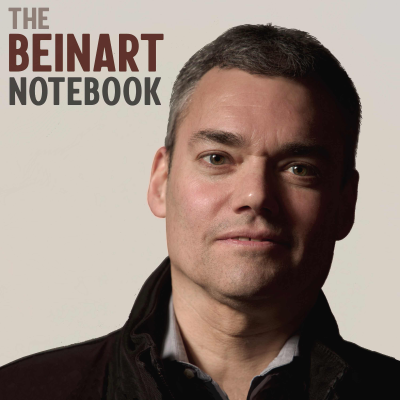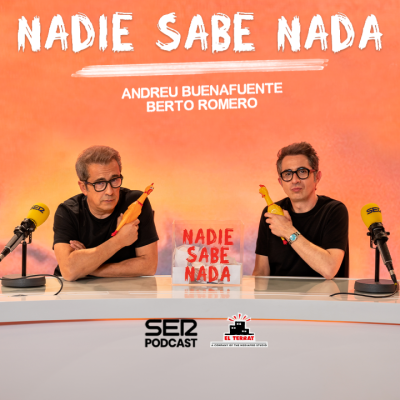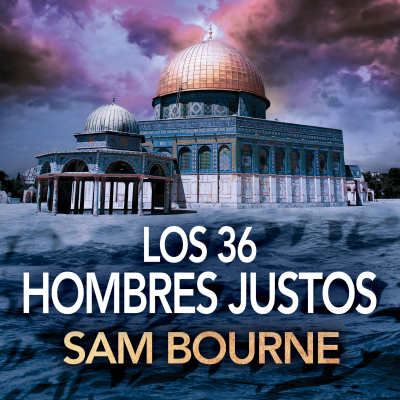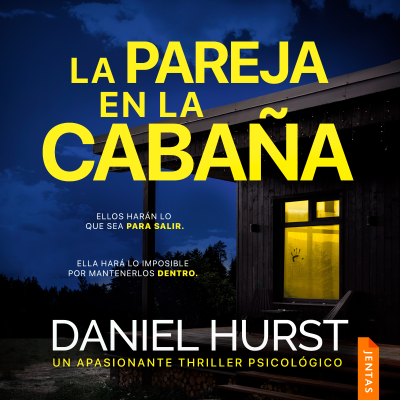
The Beinart Notebook
Podcast de Peter Beinart
A conversation about American foreign policy, Palestinian freedom and the Jewish people. peterbeinart.substack.com
Disfruta 90 días gratis
4,99 € / mes después de la prueba.Cancela cuando quieras.
Todos los episodios
141 episodiosEvery week I link to the GoFundMe page [https://www.gofundme.com/f/stand-with-my-brother-Hossam-family-in-need]for Hossam and Mariam Alzweidi, who live in Gaza with their four children and have been injured by Israeli bombs and displaced ten times since October 7, and are trying to leave. I know putting up a Go Fund Me for one family is totally inadequate given the scale of the horror in Gaza, and the millions of people there who need our help— and most of all, need an end to this monstrous slaughter. Still, it’s something. Please considering helping [https://www.gofundme.com/f/stand-with-my-brother-Hossam-family-in-need]. Friday Zoom Call: Special Time This Friday’s Zoom call, for paid subscribers, will be at a special time: 11 AM Eastern. Our guest will be former Israeli Prime Minister Ehud Olmert. He has recently called [https://www.haaretz.com/opinion/2025-05-27/ty-article-opinion/.premium/enough-is-enough-israel-is-committing-war-crimes/00000197-0dd6-df85-a197-0ff64a5c0000] Israel’s assault on Gaza a “war of devastation: indiscriminate, limitless, cruel” but denies that Israel is committing genocide and believes its actions were legitimate until the spring of 2024. He’s also argued that Israel’s current operation is fundamentally different from prior ones. I’ll ask what he would have done differently after October 7 and how he understands the fundamental nature of Zionism and the Israeli state. Ask Me Anything Our next Ask Me Anything session, for premium subscribers, will be this Wednesday, July 16, from 11-Noon Eastern time. Cited in Today’s Video The New York Times on [https://www.nytimes.com/2025/07/03/nyregion/mamdani-columbia-black-application.html] Zohran Mamdani’s application to Columbia University. Despite being expelled, Zohran Mamdani’s grandparents never stopped longing [https://jacobin.com/2020/03/zohran-mamdani-new-york-assembly-socialist] for Uganda. Mahmoud Mamdani’s fight [https://www.lrb.co.uk/the-paper/v44/n19/mahmood-mamdani/the-asian-question] for a multi-racial Uganda. Thabo Mbeki’s speech [https://www.justice.gov.za/legislation/constitution/history/MEDIA/ANC.PDF] “I am an African.” A letter [https://transitionmagazine.fas.harvard.edu/issues/issue-32/] by my father, Julian Beinart z’’ll, in the 1967 issue of Transition. Things to Read (Maybe this should be obvious, but I link to articles and videos I find provocative and significant, not necessarily ones I entirely agree with.) In Jewish Currents (subscribe [https://secure.jewishcurrents.org/forms/subscribe]!), Emily Wilder reports [https://jewishcurrents.org/inside-the-new-group-giving-antisemitism-trainings-at-harvard] on the group giving antisemitism trainings at Harvard. I spoke [https://www.democracynow.org/2025/7/8/peter_beinart] to Democracy Now about Benjamin Netanyahu’s visit to Washington. I talked [https://www.youtube.com/watch?v=kD374kraVUs&feature=youtu.be] on Bill Kalmenson’s podcast about a Jewish reckoning on Gaza. The Trump administration used [https://www.thecrimson.com/article/2025/7/10/aaup-trial-dhs-canary-mission/] Canary Mission to find students to detain. See you on Friday at 11 AM Eastern, Peter VIDEO TRANSCRIPT: So, I want to say something about this story that appeared in the New York Times based on hacked emails from Columbia University, that when Zoran Mamdani, who’s now the Democratic nominee for mayor of New York, that when he applied to Columbia University, he listed himself as not only Asian, but also as Black or African American. And so, this has been depicted, you know, this has been discussed in a lot of political circles as, oh, this guy was trying to game the system to get advantage of affirmative action by pretending he’s Black when he’s not Black. I think it fundamentally misunderstands who Zoran Mamdani is, who his family is. And part of the reason for this misunderstanding is there’s just such a profound ignorance in American political and media discussion, including in elite media and political discussion, of anything having to do with Africa, and in this case, Uganda. To understand why Mamdani checked off Black or African American, and then wrote—critically, wrote under it—Ugandan, you have to understand his family and the belief system of his family. His family were, on his father’s side, were South Asians who moved to East Africa, like many did, particularly from a part of India called Gujarat. And in his father’s family’s case, they didn’t just happen to be Asians who ended up in Uganda, they very much believed in the nation of Uganda as their identity. What happened was that when the dictator Idi Amin took power, he expelled the South Asians from Uganda in a kind of racist action, because of a basically political-economic power play, in which he was aligned with a group of economic interests from the tribe of Baganda that saw an opportunity if they pushed out the South Asian economic interests that were in Uganda, and basically took their industry and their wealth. And they allied with Idi Amin to expel the South Asians from Uganda. Interestingly, another person whose family was also expelled, but from a radically different political perspective, is the family of Kash Patel, Trump’s FBI director. But what’s critical to understand about the way this action was experienced by Mamdani’s family is that they saw themselves as having been expelled from their country, from their continent, even though, of course, they were not Black. That Zohran Mamdani talks about how his grandparents, once they had been expelled from Uganda to Britain, used to go every Sunday to Gatwick Airport in London and watch the planes taking off to Uganda, because they missed this place so much. It was their home. His father, Mahmoud Mamdani, the political scientist at Columbia, is one of the world’s great students of African politics, named Zohran Mamdani Kwame, right? He gave him the middle name of Kwame Nkrumah, the first president of a decolonized independent African country in sub-Saharan Africa. This was part of Mahmoud Mamdani’s commitment to Africa, to being Ugandan. And indeed, Mahmoud Mamdani moved back to Uganda once the new president, Yowari Museveni, allowed South Asians to return. And he went to work at Makerere University, a great university in Uganda. And Mahmoud Mamdani has written, he writes in the London Review of Books, he writes about a group called the Asian African Association of Uganda, which was formed in the 1990s, that he was an admirer of and part of. And this group, in its founding document, right, quotes ‘we are not South Asians, for South Asians live in South Asia and are committed to making a future there. Nor are we overseas South Asians, who are part of a South Asian diaspora whose members aim to return home to South Asia after a temporary sojourn overseas. True, our origin is South Asia, but our present is African. Many of us hope to make a future in Africa. We are Africans of Asian origin.’ Asian Africans. This is the way in which Zohran Mamdani was raised. This is what he was trying to say, articulate, but in trying to do through this using these crude American categories that link the idea of being someone who is of African descent with the idea of being Black. But Zoran Mandani’s entire family identity, politics, history, is about saying that that’s not true, that being an African does not require you to be Black, it requires you to be living in Africa, or have roots in Africa, and have a commitment to the development of Africa—in this case, Uganda—as a place that is multiracial, multi-ethnic. And one of the people that, um, that, uh, Mahmoud Ramdani quotes as one of the South Asians in Uganda who believed this most fervently was a man named Rajat Neogy, who edited a magazine called Transition. It was based at this great university, Makarere University, in Uganda that he edited along with Black Ugandans and South Asian Ugandans and whites and people from across the continent. And that was very important to me because we used to have copies of Transition, of this magazine in my home. I used to, you know, flip through them when I was in my father’s study growing up. My father was born in Africa. My father was born in Cape Town. And although my father left, and although I do not call myself an African American, I was lucky enough to see some of that as well, this idea that there were Jews, and there were South Asians who were in South Africa who had a profound and deep commitment to being South African, which meant also being African, even though, of course, they were not Black. That some of the most important figures in the African National Congress, who devoted their lives, who went to jail for decades, who were assassinated, were of Indian origin, or of Jewish origin. The head of the ANC’s military wing, uMkhonto we Sizwe, the ‘Spear of the Nation,’ arguably the guy who was the second most powerful figure in the African National Congress, Joe Slovo, grew up in Lithuania speaking Yiddish. And yet, he led the ANC’s armed struggle against apartheid. This is also the politics, the history that I was inculcated with, that my parents, my father and mother, taught me—just like Zohran Mamdani’s—taught me about what it meant for us to be Jews who were in South Africa, just as what it meant for his family to be South Asians who were in Uganda. And, in fact, Thabo Mbeki, the second president of post-apartheid South Africa after Nelson Mandela, gave this extraordinary speech, which I will link to, called ‘I am an African,’ in which he talks about what it means to be an African. And he specifically talks about people who come from South Asia, even he talked about Afrikaners, even he talked about Afrikaners as Africans, right? Because he didn’t see African as a racial category. Why does this matter in America today in the Trump era? Because Zohran Mamdani and his father were fighting against ethno-nationalism, against ethno-nationalist racism. One of the reasons that Idi Amin could do what he did to the South Asians of Uganda was because Uganda did not have birthright citizenship, which allowed him the constitutional legal basis to deport them. Idi Amin’s vision of Uganda is Donald Trump’s vision of America. That to be American is essentially to be white and Christian, and anyone else here is just a guest, not truly American. Zohran Mamdani’s family politics taught him far away in Uganda, in Africa, to fight against the very ethno-nationalism that he is now struggling against in the United States. The very same ethno-nationalism that leads him to believe that Israel and Palestine should be a place where people are treated equally, where Palestinians and Jews are equal citizens, rather than being part of a supremacist political project. The supremacism of Idi Amin and of Jewish supremacy in Israel, and of Donald Trump, Mahmoud Mamdani’s entire life, his family history, was about struggling against this form of supremacism. And if you don’t understand that, and how it relates to the reason that he ticked those boxes for his Columbia application, you really don’t understand, I think, who this man is. This is a public episode. If you'd like to discuss this with other subscribers or get access to bonus episodes, visit peterbeinart.substack.com/subscribe [https://peterbeinart.substack.com/subscribe?utm_medium=podcast&utm_campaign=CTA_2]
This is a free preview of a paid episode. To hear more, visit peterbeinart.substack.com [https://peterbeinart.substack.com?utm_medium=podcast&utm_campaign=CTA_7] Our guests are Gaza-born Palestinian writer Ahmed Moor, a regular contributor [https://nam12.safelinks.protection.outlook.com/?url=https%3A%2F%2Furldefense.com%2Fv3%2F__https%3A%2F%2Fwww.theguardian.com%2Fprofile%2Fahmed-moor__%3B!!GIqKXF0_-xZi!r6iHtLeRnesxl7X0rV7jEBXBwO9GNRZ3ByR37w6g3nBfDP0C-R3ahQhuNhR-D8kGf7hkhFqBw3Dvj-ptKUonWBkKLpZeQasgG8k%24&data=05%7C02%7Cksilverman%40gradcenter.cuny.edu%7Cef8cbcadd92b4005ad9408ddbe0838fe%7C0b678335d50a41d3b15230149d930cfa%7C0%7C0%7C638875664718541827%7CUnknown%7CTWFpbGZsb3d8eyJFbXB0eU1hcGkiOnRydWUsIlYiOiIwLjAuMDAwMCIsIlAiOiJXaW4zMiIsIkFOIjoiTWFpbCIsIldUIjoyfQ%3D%3D%7C0%7C%7C%7C&sdata=hU19%2FyywtGjnFmBsELNkC%2BrE4ep1y%2BmwHaFw4aID9Z8%3D&reserved=0] to The Guardian and a fellow [https://nam12.safelinks.protection.outlook.com/?url=https%3A%2F%2Furldefense.com%2Fv3%2F__https%3A%2F%2Ffmep.org%2Fresource%2Fintroducing-fmeps-2025-fellow-ahmed-moor-how-to-act-when-the-urgency-of-the-need-in-palestine-isnt-met-by-the-pace-of-change%2F__%3B!!GIqKXF0_-xZi!r6iHtLeRnesxl7X0rV7jEBXBwO9GNRZ3ByR37w6g3nBfDP0C-R3ahQhuNhR-D8kGf7hkhFqBw3Dvj-ptKUonWBkKLpZelsPxGHQ%24&data=05%7C02%7Cksilverman%40gradcenter.cuny.edu%7Cef8cbcadd92b4005ad9408ddbe0838fe%7C0b678335d50a41d3b15230149d930cfa%7C0%7C0%7C638875664718571795%7CUnknown%7CTWFpbGZsb3d8eyJFbXB0eU1hcGkiOnRydWUsIlYiOiIwLjAuMDAwMCIsIlAiOiJXaW4zMiIsIkFOIjoiTWFpbCIsIldUIjoyfQ%3D%3D%7C0%7C%7C%7C&sdata=eE%2Bhk3EYV1brR7eQfdvt6sAUp7%2Fdc8rUIxnbhLMobok%3D&reserved=0] at the Foundation for Middle East Peace, and Mairav Zonszein [https://nam12.safelinks.protection.outlook.com/?url=https%3A%2F%2Furldefense.com%2Fv3%2F__https%3A%2F%2Fwww.crisisgroup.org%2Fwho-we-are%2Fpeople%2Fmairav-zonszein__%3B!!GIqKXF0_-xZi!r6iHtLeRnesxl7X0rV7jEBXBwO9GNRZ3ByR37w6g3nBfDP0C-R3ahQhuNhR-D8kGf7hkhFqBw3Dvj-ptKUonWBkKLpZeoV7D3BQ%24&data=05%7C02%7Cksilverman%40gradcenter.cuny.edu%7Cef8cbcadd92b4005ad9408ddbe0838fe%7C0b678335d50a41d3b15230149d930cfa%7C0%7C0%7C638875664718595128%7CUnknown%7CTWFpbGZsb3d8eyJFbXB0eU1hcGkiOnRydWUsIlYiOiIwLjAuMDAwMCIsIlAiOiJXaW4zMiIsIkFOIjoiTWFpbCIsIldUIjoyfQ%3D%3D%7C0%7C%7C%7C&sdata=kbsadJjIlUzRkD5lOgxFZPdbNKjnks9BBAhsb66kewY%3D&reserved=0], Israel analyst for the International Crisis Group, and a regular contributor [https://nam12.safelinks.protection.outlook.com/?url=https%3A%2F%2Furldefense.com%2Fv3%2F__https%3A%2F%2Fwww.nytimes.com%2Fby%2Fmairav-zonszein__%3B!!GIqKXF0_-xZi!r6iHtLeRnesxl7X0rV7jEBXBwO9GNRZ3ByR37w6g3nBfDP0C-R3ahQhuNhR-D8kGf7hkhFqBw3Dvj-ptKUonWBkKLpZe5B8Rep4%24&data=05%7C02%7Cksilverman%40gradcenter.cuny.edu%7Cef8cbcadd92b4005ad9408ddbe0838fe%7C0b678335d50a41d3b15230149d930cfa%7C0%7C0%7C638875664718612155%7CUnknown%7CTWFpbGZsb3d8eyJFbXB0eU1hcGkiOnRydWUsIlYiOiIwLjAuMDAwMCIsIlAiOiJXaW4zMiIsIkFOIjoiTWFpbCIsIldUIjoyfQ%3D%3D%7C0%7C%7C%7C&sdata=0Gda6yIBZHnbzGgoncViLv52xLOmZggzcxQ8FValua4%3D&reserved=0] to the New York Times. Topics discussed include… How what people are calling a “ceasefire” might realistically play out What Hamas’s current thinking might be the visions for Gaza in the Israeli government, the military, and the Israeli public How things might change for Palestinians if Hamas is removed from power Netanyahu’s domestic political prospects how global pressure might be affecting Israel the difficulty for Palestinians of imagining making peace with a people who have done them so much harm
Every week, I link to the GoFundMe page [https://www.gofundme.com/f/stand-with-my-brother-Hossam-family-in-need]for Hossam and Mariam Alzweidi, who live in Gaza with their four children and have been injured by Israeli bombs and displaced ten times since October 7, and are trying to leave. I know putting up a Go Fund Me for one family is totally inadequate given the scale of the horror in Gaza, and the millions of people there who need our help—and most of all, need an end to this monstrous slaughter. Still, it’s something. Please considering helping [https://www.gofundme.com/f/stand-with-my-brother-Hossam-family-in-need]. Friday Zoom Call This Friday’s Zoom call, for paid subscribers, will be at our regular time, 1 PM Eastern. Our guests will be the Gaza-born Palestinian writer Ahmed Moor, a regular contributor [https://nam12.safelinks.protection.outlook.com/?url=https%3A%2F%2Furldefense.com%2Fv3%2F__https%3A%2F%2Fwww.theguardian.com%2Fprofile%2Fahmed-moor__%3B!!GIqKXF0_-xZi!r6iHtLeRnesxl7X0rV7jEBXBwO9GNRZ3ByR37w6g3nBfDP0C-R3ahQhuNhR-D8kGf7hkhFqBw3Dvj-ptKUonWBkKLpZeQasgG8k%24&data=05%7C02%7Cksilverman%40gradcenter.cuny.edu%7Cef8cbcadd92b4005ad9408ddbe0838fe%7C0b678335d50a41d3b15230149d930cfa%7C0%7C0%7C638875664718541827%7CUnknown%7CTWFpbGZsb3d8eyJFbXB0eU1hcGkiOnRydWUsIlYiOiIwLjAuMDAwMCIsIlAiOiJXaW4zMiIsIkFOIjoiTWFpbCIsIldUIjoyfQ%3D%3D%7C0%7C%7C%7C&sdata=hU19%2FyywtGjnFmBsELNkC%2BrE4ep1y%2BmwHaFw4aID9Z8%3D&reserved=0] to The Guardian and a fellow [https://nam12.safelinks.protection.outlook.com/?url=https%3A%2F%2Furldefense.com%2Fv3%2F__https%3A%2F%2Ffmep.org%2Fresource%2Fintroducing-fmeps-2025-fellow-ahmed-moor-how-to-act-when-the-urgency-of-the-need-in-palestine-isnt-met-by-the-pace-of-change%2F__%3B!!GIqKXF0_-xZi!r6iHtLeRnesxl7X0rV7jEBXBwO9GNRZ3ByR37w6g3nBfDP0C-R3ahQhuNhR-D8kGf7hkhFqBw3Dvj-ptKUonWBkKLpZelsPxGHQ%24&data=05%7C02%7Cksilverman%40gradcenter.cuny.edu%7Cef8cbcadd92b4005ad9408ddbe0838fe%7C0b678335d50a41d3b15230149d930cfa%7C0%7C0%7C638875664718571795%7CUnknown%7CTWFpbGZsb3d8eyJFbXB0eU1hcGkiOnRydWUsIlYiOiIwLjAuMDAwMCIsIlAiOiJXaW4zMiIsIkFOIjoiTWFpbCIsIldUIjoyfQ%3D%3D%7C0%7C%7C%7C&sdata=eE%2Bhk3EYV1brR7eQfdvt6sAUp7%2Fdc8rUIxnbhLMobok%3D&reserved=0] at the Foundation for Middle East Peace and Mairav Zonszein [https://nam12.safelinks.protection.outlook.com/?url=https%3A%2F%2Furldefense.com%2Fv3%2F__https%3A%2F%2Fwww.crisisgroup.org%2Fwho-we-are%2Fpeople%2Fmairav-zonszein__%3B!!GIqKXF0_-xZi!r6iHtLeRnesxl7X0rV7jEBXBwO9GNRZ3ByR37w6g3nBfDP0C-R3ahQhuNhR-D8kGf7hkhFqBw3Dvj-ptKUonWBkKLpZeoV7D3BQ%24&data=05%7C02%7Cksilverman%40gradcenter.cuny.edu%7Cef8cbcadd92b4005ad9408ddbe0838fe%7C0b678335d50a41d3b15230149d930cfa%7C0%7C0%7C638875664718595128%7CUnknown%7CTWFpbGZsb3d8eyJFbXB0eU1hcGkiOnRydWUsIlYiOiIwLjAuMDAwMCIsIlAiOiJXaW4zMiIsIkFOIjoiTWFpbCIsIldUIjoyfQ%3D%3D%7C0%7C%7C%7C&sdata=kbsadJjIlUzRkD5lOgxFZPdbNKjnks9BBAhsb66kewY%3D&reserved=0], Israel analyst for the International Crisis Group and a regular contributor [https://nam12.safelinks.protection.outlook.com/?url=https%3A%2F%2Furldefense.com%2Fv3%2F__https%3A%2F%2Fwww.nytimes.com%2Fby%2Fmairav-zonszein__%3B!!GIqKXF0_-xZi!r6iHtLeRnesxl7X0rV7jEBXBwO9GNRZ3ByR37w6g3nBfDP0C-R3ahQhuNhR-D8kGf7hkhFqBw3Dvj-ptKUonWBkKLpZe5B8Rep4%24&data=05%7C02%7Cksilverman%40gradcenter.cuny.edu%7Cef8cbcadd92b4005ad9408ddbe0838fe%7C0b678335d50a41d3b15230149d930cfa%7C0%7C0%7C638875664718612155%7CUnknown%7CTWFpbGZsb3d8eyJFbXB0eU1hcGkiOnRydWUsIlYiOiIwLjAuMDAwMCIsIlAiOiJXaW4zMiIsIkFOIjoiTWFpbCIsIldUIjoyfQ%3D%3D%7C0%7C%7C%7C&sdata=0Gda6yIBZHnbzGgoncViLv52xLOmZggzcxQ8FValua4%3D&reserved=0] to the New York Times. We’ll talk about what a ceasefire in Gaza might look like, what politics and society in Gaza will be like if and when the bombs stop falling, what the political repercussions will be in Israel, and about the broader legacy of this assault on an entire society. Cited in Today’s Video Three [https://www.hartman.org.il/gaza-the-end/] pro-Israel [https://www.youtube.com/watch?v=AhYdHAPopDo] podcasts [https://www.youtube.com/watch?v=J59b2XWAVe0] now admit that Israel can’t defeat Hamas in Gaza. The (mostly Palestinian) analysts who predicted [https://www.theguardian.com/commentisfree/2024/oct/07/mainstream-media-israel-denies-palestinian-freedom] that—and were ignored—after October 7. Israel has killed roughly four percent [https://www.haaretz.com/israel-news/2025-06-26/ty-article-magazine/.highlight/100-000-dead-what-we-know-about-gazas-true-death-toll/00000197-ad6b-d6b3-abf7-edfbb1e20000] of Gaza’s population since October 7. Things to Read (Maybe this should be obvious, but I link to articles and videos I find provocative and significant, not necessarily ones I entirely agree with.) In Jewish Currents (subscribe [https://secure.jewishcurrents.org/forms/subscribe]!), I wrote [https://jewishcurrents.org/a-new-playbook-for-democratic-critics-of-israel] about what Democrats can learn from the way Zohran Mamdani talks about Israel and antisemitism. In The New York Times, I argued [https://www.nytimes.com/2025/07/06/opinion/zohran-mamdani-democrats-israel.html?smid=tw-share] that Mamdani’s victory illustrates how rapidly Democratic public opinion is changing on Israel. I talked about Mamdani’s victory with Yousef Munayyer and Heba Gowayed for the Arab Center [https://x.com/ArabCenterWDC/status/1940824679373258823] and on WCPT 820 in Chicago [https://omny.fm/shows/joan-esposito-live-local-progressive/wcpt-820-interview-peter-beinart]. I talked [https://open.spotify.com/episode/5s13C8dhEVqmy3OYTLid2l] to Rudy Rochman about whether the world treats Israel unfairly. A reporter who covered the Palestinian intifadas reflects [https://fair.org/home/i-covered-the-intifada-its-wrong-to-say-it-means-violence-against-jews/] on what the term means. The (mostly Palestinian) analysts who predicted [https://nam12.safelinks.protection.outlook.com/?url=https%3A%2F%2Furldefense.com%2Fv3%2F__https%3A%2F%2Fwww.theguardian.com%2Fcommentisfree%2F2024%2Foct%2F07%2Fmainstream-media-israel-denies-palestinian-freedom__%3B!!GIqKXF0_-xZi!r6iHtLeRnesxl7X0rV7jEBXBwO9GNRZ3ByR37w6g3nBfDP0C-R3ahQhuNhR-D8kGf7hkhFqBw3Dvj-ptKUonWBkKLpZertW6GKk%24&data=05%7C02%7Cksilverman%40gradcenter.cuny.edu%7Cef8cbcadd92b4005ad9408ddbe0838fe%7C0b678335d50a41d3b15230149d930cfa%7C0%7C0%7C638875664718631726%7CUnknown%7CTWFpbGZsb3d8eyJFbXB0eU1hcGkiOnRydWUsIlYiOiIwLjAuMDAwMCIsIlAiOiJXaW4zMiIsIkFOIjoiTWFpbCIsIldUIjoyfQ%3D%3D%7C0%7C%7C%7C&sdata=fOpTfUysI1DM%2FX45ThljwNZLP%2BYpKg1jjjf1ZVppYxo%3D&reserved=0] Israel’s defeat—and were ignored—after October 7. See you on Friday, Peter VIDEO TRANSCRIPT: So, I spend a fair amount of time kind of listening to people I disagree with. I try to do it on our Friday Zoom calls for this newsletter. But I just do it a lot on my own time, too. I generally find, to be honest, that actually I learn more listening to people who I disagree with than those who I generally agree with. And so, on Israel and Palestine, I spend a fair amount of time kind of listening to pro-Israel podcasts and reading pro-Israel writers. First of all, I just find that there are sources of information they have that I wouldn’t have, or people who have views more like mine wouldn’t have. I don’t find those podcasts to be very useful at all in terms of understanding what’s happening to Palestinians, or really how Palestinians might react to things. But they are quite useful in kind of giving you a sense of the perspective of Israeli political insecurity establishment, the kind of Israeli political mainstream, and often the American Jewish kind of political mainstream as well. And so, it really, really struck me, kind of listening last week to several podcasts that there was this really, really frank acknowledgement that this destruction of Gaza has failed. The destruction of Gaza has failed on its own terms. Even if you didn’t give a s**t about the humanity and the lives of people in Gaza, which, of course, you should care about profoundly. That on its own terms, it has failed, right? What were the two goals of the war? Not as defined by me, but as defined by Benjamin Netanyahu, right? The first was the release of the return of the hostages. We know, it’s been clear for such a long time now, that the only way Israel has gotten significant number of hostages back has been by ending the war, through ceasefire deals, that military action has actually led to the death of more hostages than it has gotten them released, right? But the second goal, of course, was the destruction of Hamas. Total victory over Hamas, right? And what’s astonishing to me is how you find these very, very pro-war establishment Israeli Jewish voices, now saying, very frankly, ain’t gonna happen. It’s not going to happen. That has failed. And I want to quote a few of them. So, the first is Nadav Eyal, who’s a columnist for Yedioth Ahronoth. This is him on Dan Senor’s “Call Me Back” podcast. Nadav Eyal is a kind of, you know, very centrist establishment journalist, very close to the Israeli security establishment. This is what he says about the prospect of disarming Hamas at any point. He says, ‘disarming is really not going to happen for two reasons. First of all, Hamas isn’t going to agree to that in the way we think about disarmament. And secondly, even if they will, no one will be able to verify it.’ So, he’s saying, in any future deal with Hamas, Hamas will not be disarmed, right? The disarmament of Hamas is not going to happen. Yes, Israel has destroyed a lot of Hamas’s weaponry, but Nadav Eyal is smart enough to recognize that Hamas will be able to, you know, build new weaponry. In fact, it’s using a lot of weaponry, as he acknowledges now, from the massive amounts of armaments that Israel has dropped on Hamas. So, he’s saying that Hamas will not be disarmed. He also quotes Ronen Bar, the outgoing head of Shin Bet, Israel’s domestic security service, who said recently, ‘as long as there will be Palestinians in Gaza, there will be Hamas in Gaza.’ I’ll read it again. ‘As long as there will be Palestinians in Gaza, there will be Hamas in Gaza.’ This is Ronen Bar, the outgoing head of Shin Bet, Israel’s domestic security service. So, Hamas will be there, Hamas will not be disarmed. This is a quote now from another podcast from an Israeli journalist named Haviv Rettig Gur. Again, also, I would say, very centrist, very hawkish, you know, ideologically in a very, very radically different place than me, but a smart guy, right? And he says, ‘what’s the grand strategy to take a thousand little battles over 21 months and turn them into a great and significant win?’ And then he goes on, ‘nobody has articulated one in public or anywhere.’ Twenty-one months in to this destruction of Gaza, Haviv Rettig Gur, who’s been a strong supporter of the war, says, nobody has articulated any plan for how to take these individual battles where Israel’s killing Hamas members, it’s killing lots of civilians, it’s destroyed hospitals and buildings. Nobody has articulated, after 21 months, a vision for how to turn that into victory, right? And then the third, I’m gonna quote from Donniel Hartman, who’s the head of the Hartman Institute, which is a Jerusalem-based think tank, kind of liberal Zionist, quite influential among establishment American Jews, a lot of American rabbis have strong connections. This is Donniel Hartman, again who’s been a supporter of the war. He says, ‘the ability of completely wiping out Hamas is really off the table. It’s just off the table. There’s no deal in which Hamas agrees to waive the white flag.’ And then later he says, ‘the total victory is as far away as it was on October 8th.’ So, here’s what I think is likely to happen, right? There is going to be some kind of ceasefire deal likely. And, clearly, in it—as these guys are suggesting—Hamas will not be defeated. Hamas will not be defeated. Now, Hamas may not be the titular government in Gaza. They may claim that there’s some new government, if some mishmash of Arab regimes and maybe the Palestinian Authority, maybe some other Palestinians that they managed to drum up to claim that they’re in control. Maybe they’ll even be a couple of, you know, a few Hamas people who go into exile. But, essentially, underneath the surface, on the ground in Gaza, Hamas will be there. It will be an extremely powerful force. It will have its weapons, and it will create new weapons, and it will be there. And it will not in any way have been defeated or destroyed. In fact, it will claim victory precisely because it is survived when Benjamin Netanyahu said it must be totally destroyed, right? And so, I think when I listen to these folks, I think, how the f**k can you think that this was worth it. I mean, there’s a report in Haaretz that quotes a professor named Michael Spagat, who’s an economist at Holloway College at the University of London. This guy is not a radical lefty. He’s a guy who basically spends his time doing statistical analysis about violent conflicts all over the place: Iraq, Syria, Kosovo. He estimates that 4% of the population of Gaza has been killed since October 7th. Four percent. And he says, ‘I’m not sure there’s another case in the 21st century that’s reached that high,’ right? The highest percentage of any population killed in this century, right? And just by comparison—I did some back-of-the-envelope math—4% of the population killed, if you think about the percentage of people killed in Ukraine, 4% is probably 20 to 40 times higher than the percentage of people who have been killed in Ukraine, given that Ukraine has a significantly larger population, of course, than Gaza, right? So, this is, as a percentage of the population, the largest slaughter of human beings on the planet in this century. And the goals have not been met. They have not been achieved. And, you know, there were people who were saying this from the very, very beginning. They were protesting against this slaughter from the very, very beginning. And they were mocked, they were reviled, many of them were kicked out of school, they were suspended, they were expelled, they were called antisemites, all of these things, and you know what? They were right. They were right. They weren’t just morally right in seeing that this would lead to a cataclysmic loss of life, massive, massive war crimes, something that even, you know, that more and more scholars—most scholars at this point—are calling a genocide. But they could see that this would not achieve its goals, because it wasn’t possible, because slaughter and starvation doesn’t actually defeat a guerilla insurgency. Because the only way to defeat an insurgency, which Hamas is, is to deal with the root of the political grievance. And Palestinians in particular, and I’ve written about this, we’re saying this from the very beginning. They weren’t only saying that their people in Gaza would be slaughtered and starved on an astonishing scale. They were saying that Israel’s goals were unachievable. And these people also were marginalized, were mocked, were reviled. And all of these people who have much, much more prestige in the mainstream media, in mainstream establishment Jewish circles, who don’t have any problem, you know, speaking and being considered serious, serious people, now, after 21 months, after all of this, after most of the hospitals, and the schools, and the buildings, and the bakeries, and the agriculture have been destroyed, after Gaza has more child amputees than any other place on Earth, now they tell us, oh! Oops! It turns out it’s not possible. It turns out we can’t do it. And they’re gonna dress this up by saying that because Israel had, you know, bombed Iran and Hezbollah, and there was a shift in regime in Syria that supposedly, somehow, that they’ll dress that up as a win. Because they’ll say, yes, okay, we didn’t get rid of Hamas, but we restored our deterrence by basically bombing Syria and Iran, and that will be the substitute victory that’s used to mask the failure of what Israel has done in Gaza. And you know what? And it’ll be b******t because, in fact, because no matter what Israel did in Syria, in Lebanon, in Iran, it doesn’t solve the core of the problem, which is Palestinians, right? And that problem has been made massively worse, actually, from Israel’s perspective by this because it has now created, I mean, a vast generation of people who’ve grown up seeing their parents, their cousins, their brothers, their sisters killed and starved to death, and those people will be fighting against Israel probably for the rest of their lives. And God help us, probably the political organizations they create will be more radical than Hamas, because people will seek revenge for the horrors that they have seen, right? And it would be just great if there were some kind of public reckoning for all this, some kind of acknowledgement that the things that people in prestigious positions, close to power, said about this turned out not to be only to be profoundly immoral in terms of the enormous, unimaginable suffering of people in Gaza, but that even on their own strategic, military terms, they have been a failure, right? Some accounting, right? Some, maybe, apology to those people who were protesting the war from the beginning, to the Palestinian analysts and activists who said, not only is this immoral, but it’s not gonna work, right? Instead, people have the ability from the comfort of their sinecures to basically say, oops, it turned out it didn’t work, right? Oops, it turned out it didn’t work. Now we have to revise, you know, the terms on which we’re willing to end this, right? I mean, say that to a mother in Gaza who’s lost multiple children, right, who’s seen her children go day after day without food, begging, begging for food, right? I mean, somebody should be trying to create some dynamic in American and Israeli public discourse in which people are held to account for these things, you know? And my fear, my fear is just that they never will, that they never will. This is a public episode. If you'd like to discuss this with other subscribers or get access to bonus episodes, visit peterbeinart.substack.com/subscribe [https://peterbeinart.substack.com/subscribe?utm_medium=podcast&utm_campaign=CTA_2]
This is a free preview of a paid episode. To hear more, visit peterbeinart.substack.com [https://peterbeinart.substack.com?utm_medium=podcast&utm_campaign=CTA_7] Our guest is Brad Lander [https://en.wikipedia.org/wiki/Brad_Lander], the Jewish City Comptroller of New York, and mayoral candidate, who cross-endorsed Zohran Mamdani and helped propel [https://www.nytimes.com/2025/06/26/nyregion/brad-lander-zohran-mamdani.html] him to victory. In my opinion, Lander’s behavior modeled what a decent Jewish politics in America might look like. Topics discussed include… Andrew Cuomo How Lander’s relationship with Zohran Mamdani evolved Lander’s differences with Mamdani, on Israel and on local issues Criticism from parts of the Jewish community Criticism of Mamdani’s agenda for New York City The lack of support for Mamdani from prominent Democrats “Globalize the Intifada” Anti-Zionism versus liberal Zionism, one-state versus two-states
Every week I link to the GoFundMe page [https://www.gofundme.com/f/stand-with-my-brother-Hossam-family-in-need]for Hossam and Mariam Alzweidi, who live in Gaza with their four children and have been injured by Israeli bombs and displaced ten times since October 7, and are trying to leave. I know putting up a Go Fund Me for one family is totally inadequate given the scale of the horror in Gaza, and the millions of people there who need our help— and most of all, need an end to this monstrous slaughter. Still, it’s something. On June 24, Hossam sent the following message: Today, I had the heart-wrenching experience of carrying my injured son, Mu’ayyad, through the rubble-strewn streets to the Ministry of Health headquarters. With the bombings intensifying around us, even reaching the building felt like a small miracle. At the Ministry, the head of the Overseas Treatment Department examined Mu’ayyad. His words shattered us: Mu’ayyad’s injuries are extensive and life-threatening. He urgently needs surgery and specialized care that are simply not available here in Gaza. While others in our family were also injured in the blast in 2024 and need medical attention, Mu’ayyad’s condition is far more severe. When the bomb hit, he was standing closest to the window—facing it—while the others had their backs turned. He absorbed the full force of the explosion, and his body bears the deepest wounds. Yet in the midst of despair, there is a glimmer of hope. The department has arranged for Mu’ayyad—and another child in serious condition—to meet with a specialist doctor. This appointment is critical. The doctor’s assessment will help determine whether we can complete Form No. 1, required to seek urgent treatment abroad. My wife, Miriam, our children, and I are holding on to this hope with all that we have. We are waiting to hear the appointment date, God willing. Each day, I reach out to everyone involved, praying for positive developments that could lead to a brighter future for Mu'ayyad. It aches to see him enduring these terrible injuries, and I pray that God grants him the strength and patience he needs during this incredibly tough time. Your support means a great deal to us; it fuels our determination to keep moving forward. Your presence inspires us as we strive to overcome this tragedy and seek the medical help that we urgently need. Please considering helping [https://www.gofundme.com/f/stand-with-my-brother-Hossam-family-in-need]. Friday Zoom Call This Friday’s Zoom call, for paid subscribers, will be at our regular time, 1 PM Eastern. Our guest will be Brad Lander [https://en.wikipedia.org/wiki/Brad_Lander], the Jewish City Comptroller of New York, and mayoral candidate, who cross-endorsed Zohran Mamdani and helped propel [https://www.nytimes.com/2025/06/26/nyregion/brad-lander-zohran-mamdani.html] him to victory. In my opinion, Lander’s behavior modeled what a decent Jewish politics in America might look like. We’ll talk about Mamdani, the responses of Jewish New Yorkers to his victory, and why Lander did what he did. Ask Me Anything Our next Ask Me Anything session, for premium subscribers, will be this Monday, June 30, from 3-4 PM Eastern time. Cited in Today’s Video Democratic Senator Kirsten Gillibrand [https://x.com/barbarismcrit/status/1938309709842550831], Democratic House Leader Hakeem Jeffries [https://x.com/atrupar/status/1939322480314724563] and Democratic members of Congress Eric Swallwell [https://x.com/kenklippenstein/status/1939046734497222890] and Laura Gillen [https://x.com/kenklippenstein/status/1939095485404586419] attack Zohran Mamdani. Things to Read (Maybe this should be obvious, but I link to articles and videos I find provocative and significant, not necessarily ones I entirely agree with.) In Jewish Currents (subscribe [https://secure.jewishcurrents.org/forms/subscribe]!), Mari Cohen details [https://jewishcurrents.org/how-support-for-palestine-became-a-hate-crime] how, across the US, support for Palestinian freedom became considered a hate crime. For the Jewish Currents podcast, I talked [https://jewishcurrents.org/mamdani-bests-the-pro-israel-machine] with Arielle Angel, Mari Cohen, and Alex Kane about how Zohran Mamdani defeated the pro-Israel machine. For the Foundation for Middle East Peace’s Occupied Thoughts podcast, I interviewed [https://fmep.org/resource/how-iranians-have-reacted-to-the-us-israeli-attacks/] Iranian-American journalist Negar Mortazavi. Muhammad Shehada on [https://zeteo.com/p/who-is-abu-shabab-meet-the-gaza-gangster] the ISIS-related gangs Israel is backing in Gaza. See you on Monday and Friday, Peter VIDEO TRANSCRIPT: So, what’s been really depressing to me about the response to Zohran Mamdani’s victory kind of in mainstream media discussion, particularly on TV, is not the response of Republicans. I mean, many Republicans have been kind of blatantly Islamophobic. But in the era of Donald Trump, why would anyone be surprised, you know, by that? It’s really the response by Democrats, and the kind of the conversations between Democrats in mainstream, not right-wing political anchors, on TV that I find really most dispiriting. Because the only thing that they’re interested in when it comes to the subject of Israel is Mamdani’s, you know, statements about globalize the intifada. Now, again, if you do an interview and you only talk to people about Mamdani’s, you know, record about New York, I think that’s legitimate. I mean, the guy ran on making New York affordable. But if you’re going to ask Democrats about things having to do with his views on Israel, right, how on earth is it justified to have the only thing that you ask about, his claim about globalizing the intifada? For the record, I don’t think his answer in that Bulwark interview on globalize the intifada was a good answer. The thing about intifada is that it’s an ambiguous term. It can mean non-violent uprising. It can mean violent uprising against soldiers. It can mean a violent uprising against civilians, which is a war crime, a violation of international law. Mamdani doesn’t know how other people are using the term. He should have just said that the term can be inverted in, you know, that’s not my term, here’s what I believe, and talk about his belief in nonviolence and his belief in inequality. But to claim that Zohran Mamdani represents a threat to Jewish New Yorkers, is just ridiculous, right? I mean, if you just listen to what the guy has said in any kind of good faith, he’s again and again and again and again said he wants to keep Jewish New Yorkers safe. He’s talked about how serious antisemitism is as a problem. He talked about increasing funding to fight hate crimes by 800%, right? So, yes, there’s anti-Semitism. But Zora Mamdani does not pose a threat to Jewish New Yorkers, and most Jewish New Yorkers actually really know that, which is part of the reason why Mamdani’s actually done pretty well, according to polls among Jewish New Yorkers. The people whose lives are in grave threat, who are threatened by a state, right, are Palestinians in Gaza, right? It’s not on the front page of the news anymore, but Palestinians continue to be slaughtered, actually an escalating numbers, right? The slaughter goes on and on, the bombing goes on and on, it’s just more and more hellish. It becomes more and more hellish every single day. So, how on earth, if you are a Democratic politician, like these Democrats who were asked about Mamdani, like Jefferies, and Gillibrand, and Swalwell, this Congressman from California, this Congresswoman from Nassau County on Long Island, how on earth can you justify making your one comment about this question, about Israel, being the question of kind of attacking Mamdani for globalize the Intifada, right? And if you’re a news anchor, right, because the Democratic Party claims to believe that human lives are equal, right? It’s not like the Republican Party. It claims to believe that human lives are equal, right? And if you’re a mainstream news anchor who, again, also supposedly operates within some kind of broadly liberal framework, how can you justify having the one question you ask which relates to Israel and Palestine be this question about global the intifada, when you have an active slaughter going on, which has now been ruled a genocide by both of the world’s most prominent human rights organizations in different ways, Amnesty and Human Rights Watch. Again, I’m gonna keep repeating this, because it doesn’t seem to get through, right? I mean, like, in mainstream media. And basically, by most of the international legal scholars who focus on this. The Dutch newspaper NRC basically went out and interviewed a whole bunch of them, including Israelis. They all said it’s now a genocide. If you believe in human equality, how could you possibly justify asking about globalize the intifada and not asking about this catastrophic, genocidal starvation and slaughter. What it suggests is an assumption, right, which is so hardwired that I guess these people, these politicians, and these media figures are not even thinking about it, right, that Jewish lives matter infinitely more, right, than Palestinian lives. And that’s a racist assumption, right? It’s also an assumption that fundamentally violates my understanding of Jewish tradition, which starts with the recognition that all human beings, all human beings, irrespective of religion, race, ethnicity, anything, have infinite value because they’re created in the image of God. And these democratic politicians should face some consequence, some political cost, for engaging in what is this fundamentally supremacist, racist discourse, which imagines that Palestinian lives don’t matter. And these media anchors should really have to wrestle with their consciences about the fact that they are participating in this. No one is forcing them to have the only question they ask which deals with Israel and Palestine and Gaza, be a question about globalize the intifada. Again, if you asked four questions about what’s actually happening to Palestinians, and one question about globalizing Intifada, fine. But to not ask anything to politicians who are actually in Congress, who are in a position to do something about it, about America’s role in providing weapons in an act of genocide, right, it’s just fundamentally immoral. And it’s so depressing to see how this just perpetuates itself on, kind of, mindless autopilot, as if all of this death, all of this killing, all of this starvation, it just doesn’t register, it doesn’t matter because the lives of Palestinians are not considered to matter. And this is part of the reason Zohran Mamdani is different, and he broke through, is because he actually acts as if they did matter. I just wish we had a Democratic Party and a mainstream media that agreed. This is a public episode. If you'd like to discuss this with other subscribers or get access to bonus episodes, visit peterbeinart.substack.com/subscribe [https://peterbeinart.substack.com/subscribe?utm_medium=podcast&utm_campaign=CTA_2]
Disfruta 90 días gratis
4,99 € / mes después de la prueba.Cancela cuando quieras.
Podcasts exclusivos
Sin anuncios
Podcast gratuitos
Audiolibros
20 horas / mes

































